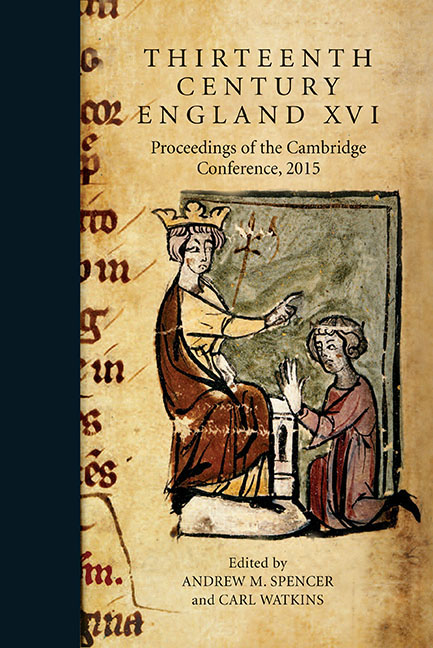Book contents
- Frontmatter
- CONTENTS
- List of Illustrations
- List of Contributors
- List of Abbreviations
- Introduction
- The Uncertainties of Reformers: Collective Anxieties and Strategic Discourses
- Moral Dilemmas in English Confessors’ Manuals
- Damnatio Eternae Mortis or Medicinalis Non Mortalis: The Ambiguities of Excommunication in Thirteenth-Century England
- The Contribution of Thomas Docking to the History of Political Thought
- Dealing with Inadequate Kingship: Uncertain Responses from Magna Carta to Deposition, 1199–1327
- The Rebel's Four Dilemmas in the Long Thirteenth Century
- The Daughters of William the Lion and Queen Ermengarde
- Simon de Montfort and the Ambiguity of Ethnicity in Thirteenth-Century Politics
- The Hue and Cry in Thirteenth-Century England
- Recalling Anglo-Scottish Relations in 1291: Historical Knowledge, Monastic Memory and the Edwardian Inquests
The Daughters of William the Lion and Queen Ermengarde
Published online by Cambridge University Press: 23 August 2019
- Frontmatter
- CONTENTS
- List of Illustrations
- List of Contributors
- List of Abbreviations
- Introduction
- The Uncertainties of Reformers: Collective Anxieties and Strategic Discourses
- Moral Dilemmas in English Confessors’ Manuals
- Damnatio Eternae Mortis or Medicinalis Non Mortalis: The Ambiguities of Excommunication in Thirteenth-Century England
- The Contribution of Thomas Docking to the History of Political Thought
- Dealing with Inadequate Kingship: Uncertain Responses from Magna Carta to Deposition, 1199–1327
- The Rebel's Four Dilemmas in the Long Thirteenth Century
- The Daughters of William the Lion and Queen Ermengarde
- Simon de Montfort and the Ambiguity of Ethnicity in Thirteenth-Century Politics
- The Hue and Cry in Thirteenth-Century England
- Recalling Anglo-Scottish Relations in 1291: Historical Knowledge, Monastic Memory and the Edwardian Inquests
Summary
The 800th anniversary of Magna Carta in 2015 gave historians the opportunity and the impetus to reappraise thoroughly both the charter as a whole and many of its lesser-known clauses. One of these clauses, number 59, committed King John to dealing with the sisters of Alexander, king of Scots, and the hostages. These two young women – the older two of Alexander II's three sisters – are thus two of the only three women referred to specifically in the charter. But while the clause shows that their situation was a cause for serious concern, it does not make at all clear what their situation was. Focusing on the lives of these two young women, and of their younger sister, allows us to gain an insight into the uncertainties and ambiguities that could beset the lives of even the highest status women in this period.
The women in question were the three daughters of William, king of Scots, and his queen consort, Ermengarde de Beaumont: Margaret, Isabella and Margaret. The elder two were entrusted to King John in 1209 as a result of the Treaty of Norham, and all three would ultimately make English matches with Hubert de Burgh, Roger III Bigod and Gilbert Marshal respectively.
William and Ermengarde had married in 1186, the match having been promoted by Henry II. Ermengarde was only aged about twelve at the marriage – much younger than her husband – and it is likely that attempts at childbearing were delayed for a few years. We know that the older Margaret was born some time before 1195, because in that year William, by now a middle-aged man with no legitimate sons, began to think about the succession. Roger of Howden records that in 1195 William devised a scheme with Richard I of England that Margaret should be married to Richard's nephew, Otto of Brunswick, and that the royal couple should be made heirs to the kingship of Scotland. In his account, Roger refers to Margaret as ‘primogenita’, from which one could infer that there was also a younger daughter. However, the chronicler also records that the king of Scots backed away from the plan because of the pregnancy of his wife, Ermengarde.
- Type
- Chapter
- Information
- Thirteenth Century England XVIProceedings of the Cambridge Conference, 2015, pp. 113 - 136Publisher: Boydell & BrewerPrint publication year: 2017



